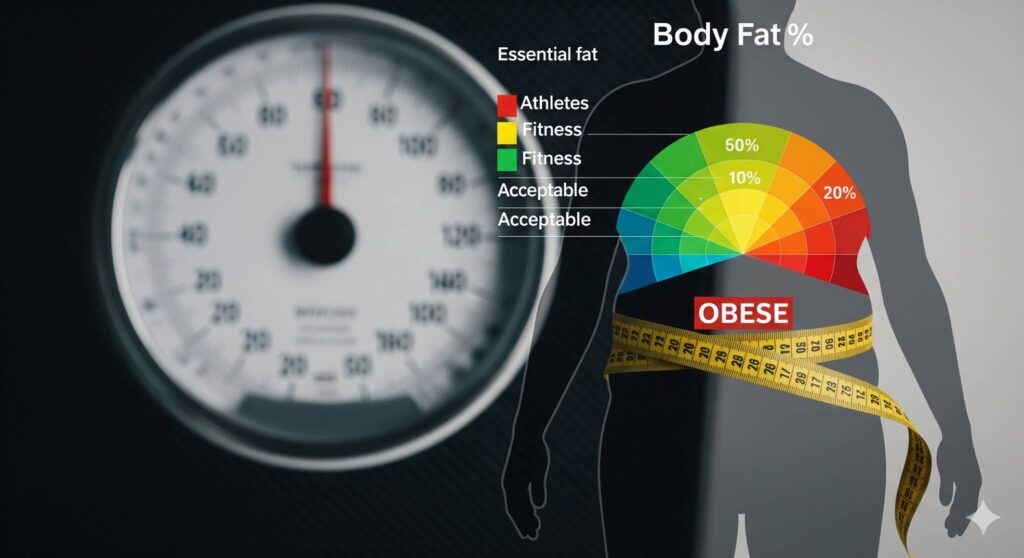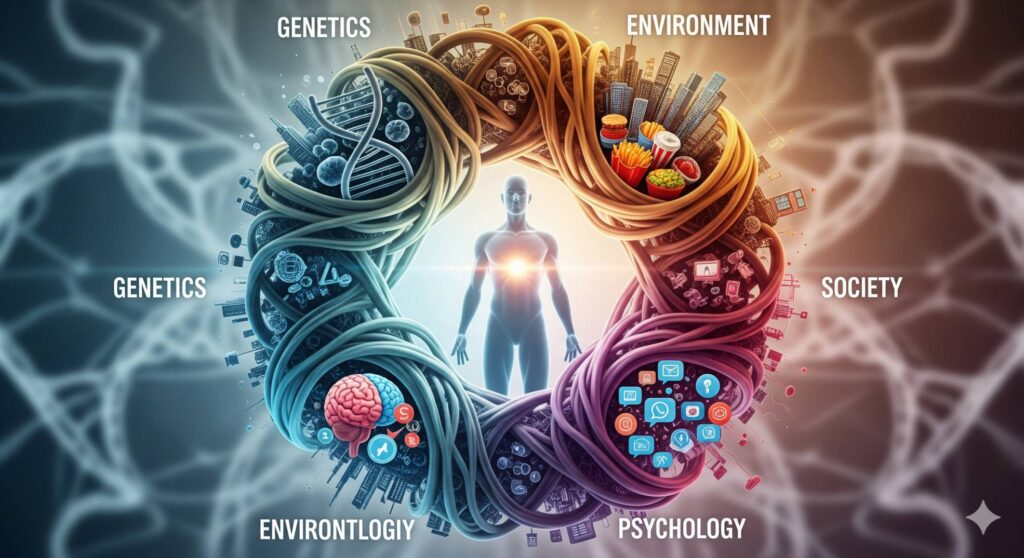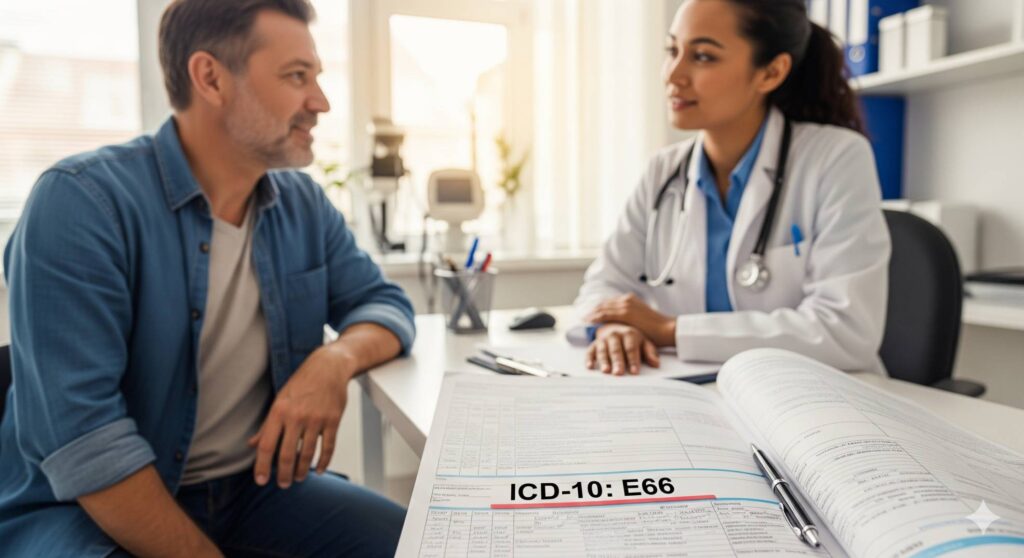If you are reading these, that means there is a high chance that you have an obesity or looking for obesity definition and this is not just a clinical term that you heard on the news. This is the word which is whispered by doctors, shouted by family members, or has silently become your insecurity in your mind. For me, it was a label that felt like a heavy in my mind and I couldn’t take off. And I didn’t even know what it truly means.
I remember that when I was studying in 7th or 8th standard, my family was going to purchase a royal clothes for the marriage and when I go to the shop and trying different clothes from the shop, I found that I was unable to wear any clothes of my size because they were unfit for me. And I also remember that the shopkeeper telling my parents that this child has fat of an adult person. This was so embarrassing that I was continuously telling my mom that it is your fault because you are giving me healthy food like ghee, milk, curd etc.
For years, I was thinking that my father has fat, so it is genetic that I will have fat. And I believed that obesity was a simple question. And I thought it was about genetics, legitimacy, and a lack of discipline. But since I have learned that it’s narrative, then I found that obesity is so much more complex and deep than the human calculation of calories in and calories out.
In this blog, we will cover the obesity definition, obesity symptoms, obesity ICD-10 codes, because understanding is the first step towards healing and compassion in the path.

What Really is Obesity? Obesity Definition
From a long time, I was believing that obesity is was very simple, that it was being fat, it was feeling of clothes not fitting, of avoiding dinner, of feeling like I took up so much space on the seat. But when I realized, it come out that it’s not simple.
The BMI: A Starting Point, Not the Whole Story
The first and the most common one, as well as the most basic tool used by the players to define the obesity is the Body Mask Index, which is also known as by its short form BMI-2. I am sure that you have heard of it. It is a simple formula which is calculated by your height and weight, which at the end comes to number. That number then is placed into a category that you are underweight, normal weight, or overweight, or you have obesity. This device will give you that number. Then you do a re-calculation that in which category you are today.
The formula is, your weight in kilogram is divided by the square of your height in meter. For most adults, the categories look something like underweight below 18.5, normal or healthy weight is 18.5 to 24.9, overweight is 25.0 to 29.9, and obesity is 30 or higher.
The Tangled Web: Unraveling the Causes of Obesity
Obesity Cause is a simple thing that tells, you have failed in a personal responsibility. It ignores the power, complex, and often invisible force that contributes to this condition. But the truth is that the causes of obesity are a tangled web of genetics, environment, psychology, and biology. It’s not about the single choice you made in your life, but other thousands of different factors intersecting over a lifetime.
Our gene has not changed as much in 15 years as compared to the environment. Our environment has dramatically changed in last 15 years that we live in this environment in which actively promotes weight gain. This is the most significant modern obesity cause. In today’s days we are surrounded my so much of fast food and junk food that we are not much away from it. This fast food have perfect combination of salt, sugar and spices that our tongue can’t resist it from taking again and again.
Source : NIDDK

The Genetic Blueprint: It’s Not Just in Your Jeans, It’s in Your Genes
Let me ask you a question that, have you ever felt like you are fighting for managing your weight and someone is frequently eating fast food even after he has well-maintained weight? That’s where the genetics come, genetics are very powerful, the scientists have identified hundreds of genes that can influence everything from your appetite and metabolism to your body’s store fats.
The Silent Alarms: Health Complications as Symptoms
Obesity symptoms are very silent that even you can’t notice it. This disease’s symptoms are developing and giving you signs gradually but you are not taking it seriously. These signs are not much bigger to be noticeable. The obesity symptoms can lead to type 2 diabetes. This is one of the most well-known and famous complications that have excessive fat especially around your abdomen can cause your body cells to become resistant to produce insulin. Insulin is the hormone which regulates your blood sugar.
Second, high blood pressure which is also known as hypertension. Your heart has to pump harder to get blood to the all extra tissues in your body which increase the pressure on your artery walls. Third, heart disease and stroke. High blood pressure, high cholesterol, high blood sugar are the three risk factors for heart attack and stroke and all are strongly linked with obesity. Obesity is a major risk factor for at least 13 types of cancers including breast, colon, kidney cancer, fatty liver disease,
Most painful obesity symptoms are emotional and psychological. These symptoms are invisible. They can be the most dangerous for all. You will feel low self-esteem, poor body image, depression and anxiety, social isolation, weight bias, and stigma, etc. These are the obesity symptoms which can be seen.
Source : Mayo Clinic

Why the Obesity ICD 10 Code Matters So Much
I think that the existence of Obesity ICD 10 codes is more important than it might seem, I have provided you some reason that why it is important.
First is, Obesity ICD 10 is officially recognized as a disease. Many people see obesity as a part of shame, but remember that obesity is a disease, and a disease is something to be treated, not something to be ashamed of. From many years, most of the people, including some which are in the medical community, view obesity as a lifestyle choice or a simple consequence of behavior. But actually, the Obesity ICD code solidifies that status as it is a legitimate, diagnosable medical disease, just like diabetes or asthma.
Second, it unlocks insurance, coverage, and treatment. This is one of the best benefits of the Obesity ICD 10 codes that Obesity is coded as a disease that means treatment for it are more likely to be cover by the health insurance without any issues. This insurance can cover the appointments with dieticians, medical supervisors, weight management programs, weight loss medication, and even some surgeries. Without Obesity ICD 10 course, many of these treatments would be considered as cosmetic or lifestyle choice and patients would have to pay some amount for it. But with Obesity ICD 10 course, patient does not have to pay from their pocket and it literally opens the door to getting the help you need.
Third, it allows for better public health tracking. On the big scale, the Obesity ICD-10 code allows public health organizations like CDC and WHO to get the information that how many people are affected by obesity. By collecting the data on the basis of how many people have been detected with the E66 code, they can understand the danger of the disease and identify at-risk population, allocate resources for prevention and treatment, and measure the effectiveness of the public health initiative.
The classification system of obesity codes, ICD codes, are more detailed. The main code is E66, but there are several other sub-codes which provide detailed information about the type of or the complexity of the obesity.
E66.01: Morbid (severe) obesity due to excess calories
E66.1: Drug-induced obesity
E66.3: Overweight
E66.8: Other obesity
E66.9: Obesity, unspecified
This level of detailed information helps doctors to plan the treatment more efficiently and it helps researchers to understand different types of obesity and causes of obesity. Obesity ICD-10 Codes help people to transform their mindset from taking obesity as a personal shape into the disease.
Source : World Health Organization (WHO), Centers for Medicare & Medicaid Services (CMS)

Overview
This blog has provided you evidence-based information and what is obesity, obesity definition, obesity causes, obesity symptoms, obesity ICD-10 codes, and transforming your view from taking obesity as a personal failure to as a disease that can be treatable or curable. This post encourages people to seek compassionate, science-driven care and move towards treatment.
Sometimes obesity become so unsecure about their weight that they feel ashamed in the society, but that’s not the way to deal with obesity, you have to accept yourself first, and remember that it’s completely fine if you have obesity, and stop thinking about the people that what they thing because you are standing on you legs not on there’s. Your legs are holding your weight not there’s , so become joyful and if you are not comfortable with your weight then loose it, there are several natural options available to loose weight.
